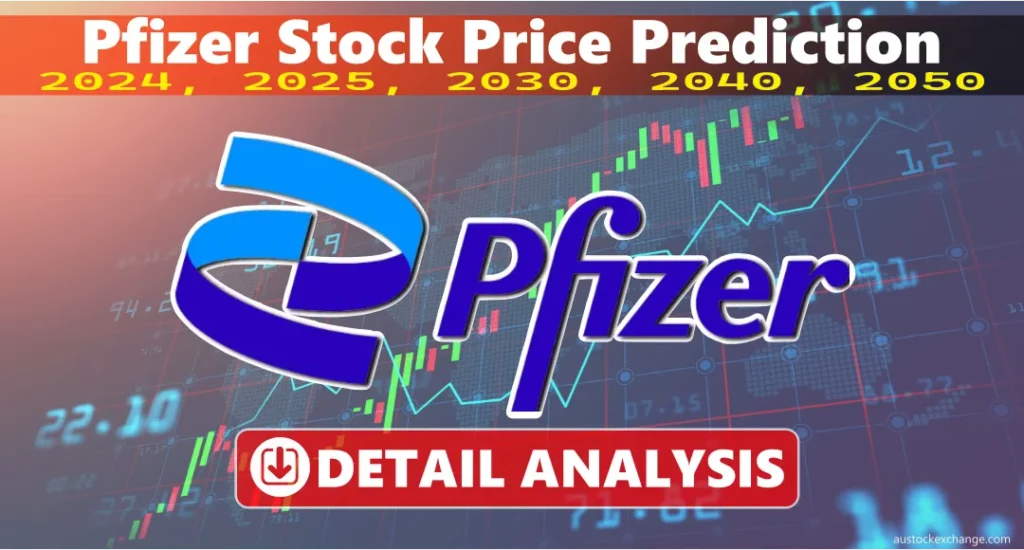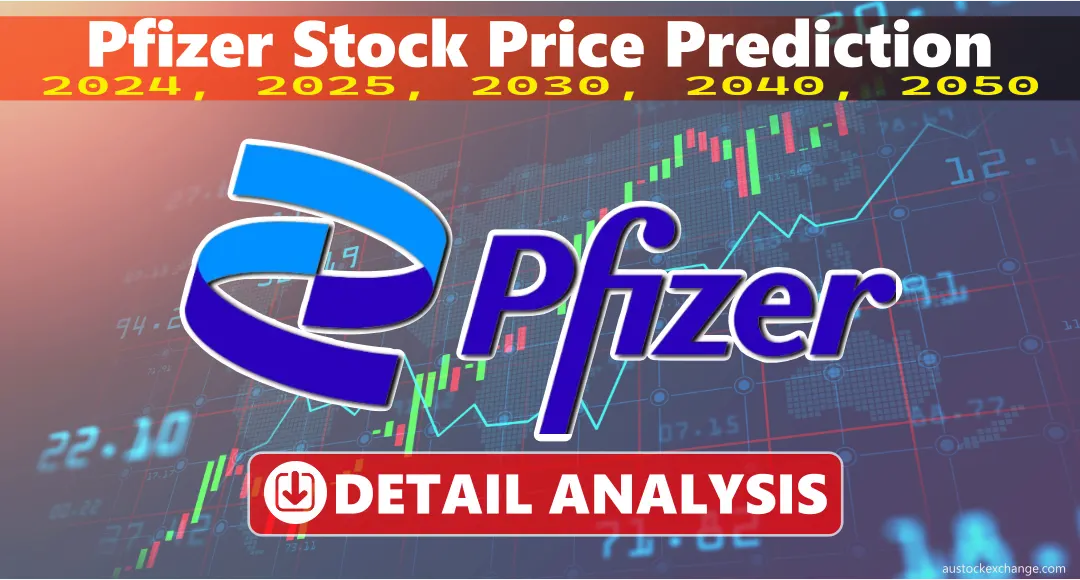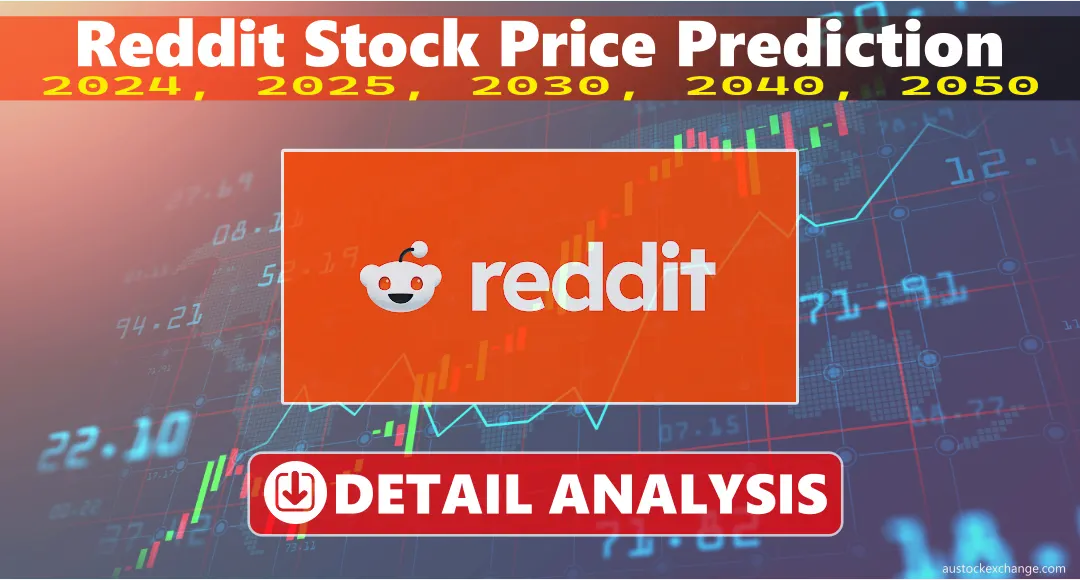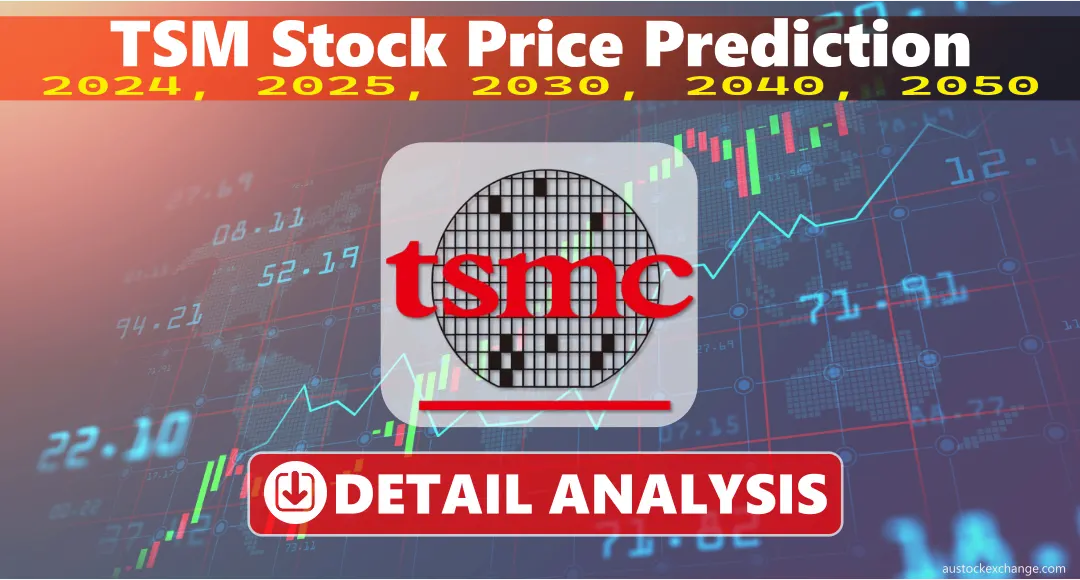Pfizer Stock | Stock Price Prediction 2025 – 2050 (Detailed Analysis)
Pfizer Inc. (NYSE: PFE) has shown resilience and creativity in the ever-changing healthcare and pharmaceutical industry. Pfizer, a global biopharmaceutical giant, has developed life-saving drugs and treatments that have changed millions of lives. Pfizer, a powerful industrial player with almost 170 years of existence, pushes scientific development.
In this article, we analyze Pfizer stock’s growth potential and project its price for 2024, 2025, 2030, 2040, and 2050.
What is Pfizer Inc NYSE: PFE?
Pfizer Inc. is a New York-based pharmaceutical and biotechnology company. One of the world’s biggest and most powerful pharmaceutical firms, Pfizer pioneered several medications, vaccines, and consumer healthcare items. Its portfolio includes cancer, cardiology, immunology, and infectious disease medications in over 180 countries.
Pfizer Stock Price Prediction 2025
Predicting stock prices requires studying the company’s financial performance, industry developments, economic circumstances, and market sentiment. Based on extensive study and market research, here are our Pfizer stock price predictions. In 2025, its stock price would be $32.60, as per our analysis.
By our prediction, its stock price would be between $20.02 to $32.60 in 2025.
| Year | Minimum Price ($) | Maximum Price ($) |
| 2025 | $20.02 | $32.60 |
| Month | Minimum Price ($) | Maximum Price ($) |
| January | $25.85 | $27.57 |
| February | $25.17 | $27.03 |
| March | $24.61 | $27.24 |
| April | $22.34 | $27.41 |
| May | $23.45 | $27.87 |
| June | $25.63 | $28.33 |
| July | $25.87 | $28.89 |
| August | $26.31 | $29.25 |
| September | $26.64 | $29.84 |
| October | $27.22 | $30.51 |
| November | $28.31 | $31.11 |
| December | $29.55 | $32.60 |
Pfizer Stock Price Prediction 2026
In 2026, its stock price would be $44.33, as per our analysis.
By our prediction, its stock price would be between $31.38 to $44.33 in 2026.
| Year | Minimum Price ($) | Maximum Price ($) |
| 2026 | $31.38 | $44.33 |
| Month | Minimum Price ($) | Maximum Price ($) |
| January | $29.55 | $32.87 |
| February | $30.47 | $33.65 |
| March | $31.21 | $34.25 |
| April | $32.45 | $34.87 |
| May | $32.87 | $35.35 |
| June | $33.54 | $36.41 |
| July | $34.25 | $37.21 |
| August | $35.27 | $38.33 |
| September | $36.71 | $39.64 |
| October | $37.56 | $41.57 |
| November | $38.77 | $43.51 |
| December | $42.25 | $44.33 |
Stock Price Prediction 2027
In 2027, its stock price would be $56.90, as per our analysis.
By our prediction, its stock price would be between $42.25 to $56.90 in 2027.
| Year | Minimum Price ($) | Maximum Price ($) |
| 2027 | $42.25 | $56.90 |
Stock Price Prediction 2028
In 2028, its stock price would be $70.50, as per our analysis.
By our prediction, its stock price would be between $55.75 to $70.50 in 2028.
| Year | Minimum Price ($) | Maximum Price ($) |
| 2028 | $55.75 | $70.50 |
Stock Price Prediction 2029
In 2029, its stock price would be $85.01, as per our analysis.
By our prediction, its stock price would be between $69.51 to $85.01 in 2029.
| Year | Minimum Price ($) | Maximum Price ($) |
| 2029 | $69.51 | $85.01 |
Pfizer Stock Price Prediction 2030
In 2030, its stock price would be $99.60, as per our analysis.
By our prediction, its stock price would be between $83.62 to $99.60 in 2030.
| Year | Minimum Price ($) | Maximum Price ($) |
| 2030 | $83.62 | $99.60 |
| Month | Minimum Price ($) | Maximum Price ($) |
| January | $83.62 | $85.25 |
| February | $83.88 | $86.41 |
| March | $84.35 | $87.64 |
| April | $85.74 | $88.67 |
| May | $86.15 | $89.74 |
| June | $87.15 | $91.58 |
| July | $89.15 | $92.58 |
| August | $90.47 | $93.54 |
| September | $91.23 | $95.64 |
| October | $92.74 | $97.15 |
| November | $94.41 | $98.15 |
| December | $96.68 | $99.60 |
Stock Price Prediction 2040
In 2040, its stock price would be $220.54, as per our analysis.
By our prediction, its stock price would be between $200.70 to $220.54 in 2040.
| Year | Minimum Price ($) | Maximum Price ($) |
| 2040 | $200.70 | $220.54 |
| Month | Minimum Price ($) | Maximum Price ($) |
| January | $200.70 | $203.54 |
| February | $201.25 | $206.74 |
| March | $203.41 | $208.45 |
| April | $205.15 | $210.25 |
| May | $208.54 | $212.54 |
| June | $210.54 | $216.45 |
| July | $212.57 | $218.54 |
| August | $216.45 | $220.54 |
| September | $218.45 | $222.54 |
| October | $220.15 | $226.54 |
| November | $224.54 | $229.65 |
| December | $226.57 | $237.54 |
Stock Price Prediction 2050
In 2050, its stock price would be $365.25, as per our analysis.
By our prediction, its stock price would be between $344.63 to $365.25 in 2050.
| Year | Minimum Price ($) | Maximum Price ($) |
| 2050 | $344.63 | $365.25 |
| Month | Minimum Price ($) | Maximum Price ($) |
| January | $344.63 | $348.54 |
| February | $345.57 | $351.57 |
| March | $346.54 | $353.54 |
| April | $348.15 | $355.14 |
| May | $351.45 | $357.25 |
| June | $352.54 | $362.54 |
| July | $353.54 | $367.54 |
| August | $355.57 | $371.54 |
| September | $358.54 | $375.55 |
| October | $361.54 | $381.58 |
| November | $364.57 | $384.56 |
| December | $370.58 | $390.25 |
Price Summary
| Year | Minimum Price ($) | Maximum Price ($) |
| 2025 | $20.02 | $32.60 |
| 2026 | $31.38 | $44.33 |
| 2027 | $42.25 | $56.90 |
| 2028 | $55.75 | $70.50 |
| 2029 | $69.51 | $85.01 |
| 2030 | $83.62 | $99.60 |
| 2040 | $200.70 | $220.54 |
| 2050 | $344.63 | $365.25 |
Is Pfizer Stock Good to Buy? (Bull Case & Bear Case)
Bull Case:
- Pfizer’s extensive portfolio of pharmaceuticals in several therapeutic areas supports growth and risk reduction by decreasing dependence on any particular product or market sector.
- Pfizer spends heavily on R&D to produce blockbuster medications and novel cures that might boost revenue.
- With a presence in over 180 countries, Pfizer can leverage development prospects in established and developing areas to increase its customer base and market share.
- Strategic alliances and acquisitions have helped Pfizer acquire new technology, extend its product line, and boost its competitive position.
Bear Case:
- Like many pharmaceutical firms, Pfizer risks patent expirations for its blockbuster pharmaceuticals, which may lower revenue and profitability when generics enter the market.
- Increased attention to prescription prices and healthcare expenses might affect Pfizer’s pricing strategy and profit margins, especially in regions with strict regulations or government-controlled pricing.
- Pharmaceutical firms compete to discover new cures and win market share, which might hurt Pfizer’s market share and profitability.
- New medications need strict regulatory authorization, so delays or setbacks might hinder Pfizer’s ability to launch them.
Key Details About Pfizer
- Headquarters: New York City, New York, United States
- Founded: 1849
- CEO: Albert Bourla
- Employees: Approximately 83,000 (as of 2022)
- Revenue: $100.3 billion (FY 2022)
- Net Income: $31.4 billion (FY 2022)
- Market Capitalization: Approximately $280 billion (as of April 2024)
Pfizer Financial (Balance Sheet)
- Total Assets: $236.9 billion (FY 2022)
- Total Liabilities: $122.9 billion (FY 2022)
- Total Equity: $114.0 billion (FY 2022)
- Cash and Cash Equivalents: $29.7 billion (FY 2022)
- Long-Term Debt: $39.2 billion (FY 2022)
Key Performance Indicators
- Revenue Growth (YoY): 23.6% (FY 2022)
- Net Income Growth (YoY): 43.0% (FY 2022)
- Operating Margin: 37.4% (FY 2022)
- Return on Equity (ROE): 27.6% (FY 2022)
- R&D Expenditure: $11.4 billion (FY 2022)
Comparison with Listed Peers
To comprehend Pfizer’s standing in the industry, compare its performance to that of other big pharmaceutical and biotechnology companies. Key measures compared to Pfizer’s listed peers:
| Company | Market Cap | Revenue | Net Income | Operating Margin | ROE |
| Pfizer | $280 billion | $100.3B | $31.4B | 37.4% | 27.6% |
| Johnson & Johnson | $490 billion | $94.9B | $18.7B | 26.6% | 25.2% |
| Merck | $270 billion | $59.3B | $14.7B | 28.1% | 23.5% |
| AstraZeneca | $218 billion | $41.0B | $5.6B | 24.3% | 17.8% |
Positive & Negative Factors to Invest in Pfizer

Positive Factors:
- Pfizer’s extensive portfolio of pharmaceuticals in several therapeutic areas supports growth and risk reduction by decreasing dependence on any particular product or market sector.
- Pfizer spends heavily on R&D to produce blockbuster medications and novel cures that might boost revenue.
- Pfizer can leverage development prospects in established and developing areas to increase its customer base and market share with a presence in over 180 countries.
- Strategic alliances and acquisitions have helped Pfizer acquire new technology, extend its product line, and boost its competitive position.
Negative Factors:
- Pfizer, like many pharmaceutical firms, risks patent expirations for its blockbuster pharmaceuticals, which may lower revenue and profitability when generics join the market.
- Increased attention on prescription price and healthcare expenses might affect Pfizer’s pricing strategy and profit margins, especially in regions with strict regulations or government-controlled pricing.
- Pharmaceutical firms compete to discover new cures and win market share, which might hurt Pfizer’s market share and profitability.
- New medications need strict regulatory authorization, so delays or setbacks might hinder Pfizer’s ability to launch them.
Conclusion
Pfizer Inc.’s stock is a good investment in the fast-changing pharmaceutical and biotechnology industries. Pfizer can benefit on the rising demand for new healthcare solutions with its varied portfolio, strong pipeline, global reach, and strategic alliances and acquisitions.
Investors should weigh the bull and bear arguments, the company’s financial performance, patent expirations, price pressures, competition, and regulatory impediments. Pfizer investors must weigh the risks and benefits of this pharmaceutical giant.








